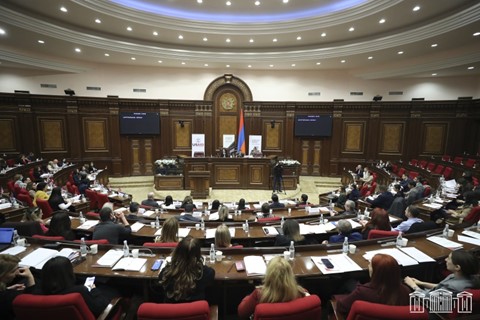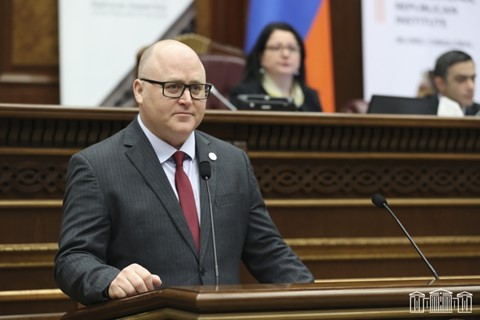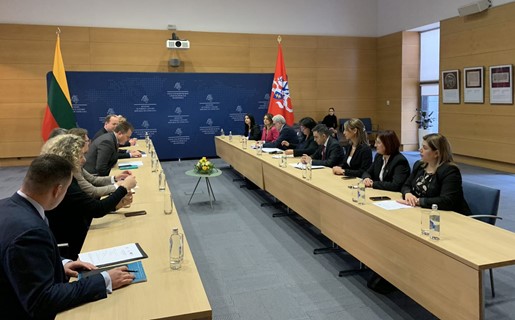IRI Helps Female Parliamentarian Gain Momentum for Inclusive Legislation in Armenia

On a Wednesday afternoon in June, Heriknaz Tigranyan stood before the Armenian Parliament as it passed the bill meant to reform voluntary work laws. Tigranyan, a member of Parliament and IRI’s close partner, pioneered the legislation. She sought to make Armenia’s laws on volunteering more inclusive, citizen-centered, and responsive to the challenges of the 21st century. Just a few months earlier, she had successfully led a major labor code reform, transforming the country’s workplace relations. Piercing through perpetual parliamentary deadlock, Tigranyan’s two reforms represent some of the most significant legislative actions in the recent history of Armenia.
Before these reforms, Armenia’s legal foundation behind labor relations had grown increasingly outdated and detached from real-world practice. It failed to protect employees’ rights in the complex modern workplace. For instance, internships were not designated as a legal category at all, and employers could unilaterally fire their employees as they reached retirement age. Meanwhile, a comprehensive state policy on volunteering simply did not exist. Multiple legal acts regulated voluntary work, often overlapping and contradicting each other. This complexity undermined the rights of volunteers and hindered the development of the volunteering culture in Armenia.
When Tigranyan expressed her desire to reform the labor code and the law on volunteering, IRI and Tigranyan met to identify areas where the Institute could support her efforts. IRI set out to help Tigranyan make the debate about the laws as inclusive as possible by involving all stakeholders – employers, employees, government agencies, and experts alike. IRI put together meetings between parliamentary teams from the Health Care and Social Welfare Committee, where Tigranyan serves as Deputy Chair, and the Ministry of Labor and Social Affairs to facilitate the discussion within the government itself. IRI also worked closely with Tigranyan to organize two public hearings with more than 100 attendees from all strata of society; the first hearing in February covered the labor code, and the second hearing in May focused on the volunteering law.

Tigranyan also sought to pass laws that adhere to the highest standards and capture the complexity of modern Armenian society. IRI leveraged its extensive in-country network to organize multiple consultations and committee hearings with the country’s leading experts and civil society organizations. These interactions not only benefited Tigranyan’s legislative efforts, but also helped build trust between the government and civil society, paving the way for broader societal involvement in the reform effort.
The search for in-country experts, however, revealed that many Armenian political experts lacked experience working with labor and volunteering legislation. IRI turned to its global network to help Tigranyan’s team study best practices from around the world. In November 2022, IRI brought an Armenian parliamentary delegation to Vilnius, Lithuania, where the parliament had passed a transformative labor law reform only a few years before. In parliamentary chambers and government agencies, Tigranyan and other Armenian parliamentarians met with the very Lithuanian leaders responsible for their labor reform and learned about the challenges they faced.

Tigranyan’s labor code reform went up for vote in the Armenian Parliament on May 3. With broad societal support secured and legislation professionally designed with IRI’s assistance, the labor reform passed with 81 votes in favor and 5 abstentions. The bill amended half of the labor code’s 266 articles, revolutionizing labor relations in Armenia. The law on volunteering followed shortly thereafter on June 14, with 65 votes in favor and 29 abstentions, unifying Armenia’s state policy toward voluntary work.
IRI’s success in assisting Tigranyan to pass citizen-centered legislation serves as a model for other reforms in Armenia and beyond. This momentous success demonstrates that democratizing the legislative process through the involvement of civil society and the public is crucial for the democratization of a country as a whole.
Top